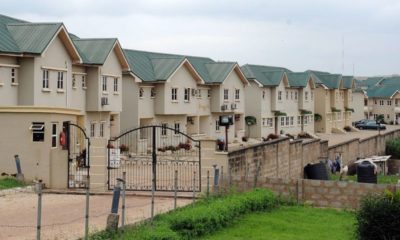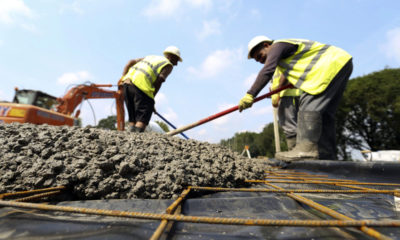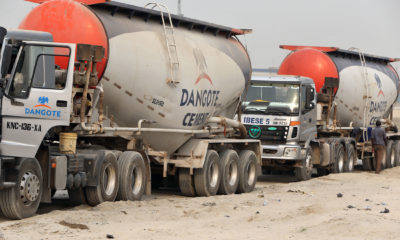Economy
Only Government Can End Building Collapse -Experts
Published
6 years agoon

- Only Government Can End Building Collapse, Say Experts
Except the government makes a commitment to go tough on enforcement of relevant laws, the scourge of building collapse may not end soon, experts in the built environment have said.
They noted that the cause of the recent collapse on Lagos Island which claimed no fewer than 20 lives was not different from the causes of previous ones in the same area and other parts of the state as well as the entire country.
Some of the building construction experts, who spoke with The PUNCH, lamented that the menace of building collapse had remained because the regulatory bodies lacked the will to enforce laws.
They explained that while the issues had been overflogged and the causes known to almost everyone in the society, only the government had the power to go tough on errant developers, landlords, traditional rulers, thugs or anyone found contravening planning laws or engaging in activities that could lead to the collapse of a building.
“I have visited several sites of collapsed buildings on Lagos Island, these buildings have similar causes and the major reason is that the buildings were not properly constructed. When you talk of quality, many of them were lacking in the area of workmanship and material. Lagos Island also, especially this Ita Faaji area, used to be a swampy area which should not take five-storey buildings,” the 1st Vice -President of the Nigerian Institute of Building, Mr Kunle Awobodu, said.
Awobodu, a former President of Building Collapse Prevention Guild, described the problem of building construction on Lagos Island as huge, adding that those in the government knew the unfortunate situation.
“So how could a serious government official allow some kind of development in that area, I believe it is either as a result of compromise or they have some other issues we don’t know about. When you talk about regulations, I think there has been so much negligence. The government has tolerated illegal development. Regulation failed or became too tolerant to have encouraged shoddy development,” he said.
He stated that as a matter of urgency, the Lagos State Government should suspend construction of any kind of building, especially residential on Lagos Island to forestall more disasters.
The President, Nigerian Institute of Structural Engineers, Mr Eddy Atumonyogo, said there had been a lot of actions and inactions on the part of the government and other stakeholders that had promoted collapse of buildings.
“If faulty designs are approved for construction, there will be a collapse. If design standards are not enforced during construction, there will be a collapse. If fake materials are not detected and are used in construction, it will lead to a collapse,” he explained.
On March 13, a four-storey building on Massey Street, Ita-Faaji, Lagos Island, collapsed in the early hours of the day, killing at least 20 pupils and other tenants, with many others injured.
The incident was one of several cases in the area and in Lagos as a state as well as other parts of the country.
It is estimated that there had been over 100 cases of building collapse in the last seven years with Lagos recording the highest number of both collapsed buildings and number of casualties.
According to Awobodu, the persistency of building collapse in Nigeria brings to fore two categories of failure: those buildings that lacked durability due to past construction errors and buildings that collapsed before maturity, under construction due to design error or substandard human and material resources.
He stated that the cost of conducting structural integrity test and subsequent demolition remained a major reason why old buildings still collapsed and killed occupants while circumvention of due process was responsible for the collapse of buildings under construction.
A Past Chairman, Nigerian Institute of Builders, Lagos State Chapter, Mr Olatunde Jaiyesinmi, said if the government was serious about curbing the problem of building collapse, the professionals in the built environment should be listened to.
“The laws setting up these professional bodies specify their roles in the industry. If these roles are adhered to, building collapse will be minimised if not eliminated,” he said.
Jaiyesinmi, who is also a former chairman of the Nigerian Society of Engineers, Lagos Branch, said about 11 years ago, the then governor of Lagos State had assembled all professionals in the built environment and charged them to proffer solutions to the issue of building collapse.
“Solutions were proffered, but government had no will power to implement them,” he added.
Atumonyogo, however, stated that apart from the government which had a major role to play in enforcing building regulations, there were other actors in the industry such as developers that also needed to act responsibly.
Awobodu stated that some of developers had said they did not have confidence in most of the buildings they ignorantly constructed in the past.
He said such builders had said they would not mind a situation where such buildings could be pulled down for safety purposes but the challenge had always been who would bear the cost of demolition and where the occupants of such building would be accommodated.
But apart from developers, the experts also called on the government to pay more attention to manufacturers and importers of building materials.
They alleged that some importers of building materials were guilty of encouraging factories in China to produce low quality materials that did not conform with the specifications of standard building materials.
The President, Nigerian Institute of Town Planners, Mr Lekwa Ezutah, said no aspect or detail of building construction should be treated with levity.
“All legislative provisions must be reviewed by the National Assembly and strictly observed, failing which appropriate sanctions must be meted to defaulters,” he said.
On the way forward, the experts said the government especially the Lagos State Government should intensify effort towards urban regeneration in older parts of the city such as on Lagos Island, and also employ more officials to monitor construction of new buildings as well as renovation of older ones.
“The government should find a way of relocating the residents in the areas around Lagos Island towards urban regeneration. It requires huge financial resources because you can’t demolish people’s buildings without providing alternative accommodation but it has to be done. If not, more buildings will still collapse,” Awobodu said.
Ezutah opined that the government, as a matter of urgent necessity, should commission professional planners to carry out in-depth studies of cities with a view to recommending sustainable policies and plans to address the matter.
He stated that cities were the engines of growth in any society; hence matters that affected their viability and liveability should be priorities to the government and all stakeholders.
He also called on the professionals who either build or undertake to supervise buildings on the need to verify the brand, quality, and quantity of materials used for buildings.
“Professional bodies need to step-up in their responsibilities to sanction members who compromise standards. The implementation of Site Analysis Report and Environmental Impact Assessment are to be strictly undertaken for every development,” he said.
Atumonyogo also called on the governments at all levels to ensure they had registered structural engineers in the building approval and control agencies.
“They must ensure that buildings above two floors, and buildings to be erected on poor soil, must be designed and supervised by registered structural engineers. Legislation must be passed to back up this practice. Structural engineering is a specialist branch of civil engineering. We have had enough of these avoidable deaths and the time to act is now,” he added.
Is the CEO and Founder of Investors King Limited. He is a seasoned foreign exchange research analyst and a published author on Yahoo Finance, Business Insider, Nasdaq, Entrepreneur.com, Investorplace, and other prominent platforms. With over two decades of experience in global financial markets, Olukoya is well-recognized in the industry.

You may like
-


FG Warns Property Owners: Settle Ground Rent in 60 Days or Lose Certificates of Occupancy
-


Pension Funds Boost Real Estate Investments to N1 Trillion in 2023
-


Developers Reject Federal Government’s Cement Price Reduction Agreement
-


Real Estate and Construction Boom: A Steady Pillar of Nigeria’s Economic Growth Amidst Challenging Times
-


Lagos Renters Struggle as Soaring Costs Push Housing Out of Reach
-


Construction and Real Estate Sector’s VAT Revenue Soars by 124% to N22.45bn in 2022
Sign up for our Daily newsletter
We’ll be in your inbox every morning Monday-Saturday with all the day’s top business news, inspiring stories, best advice and reporting from Entrepreneur, To share your newsletter use this email: entrepreneuredition@



